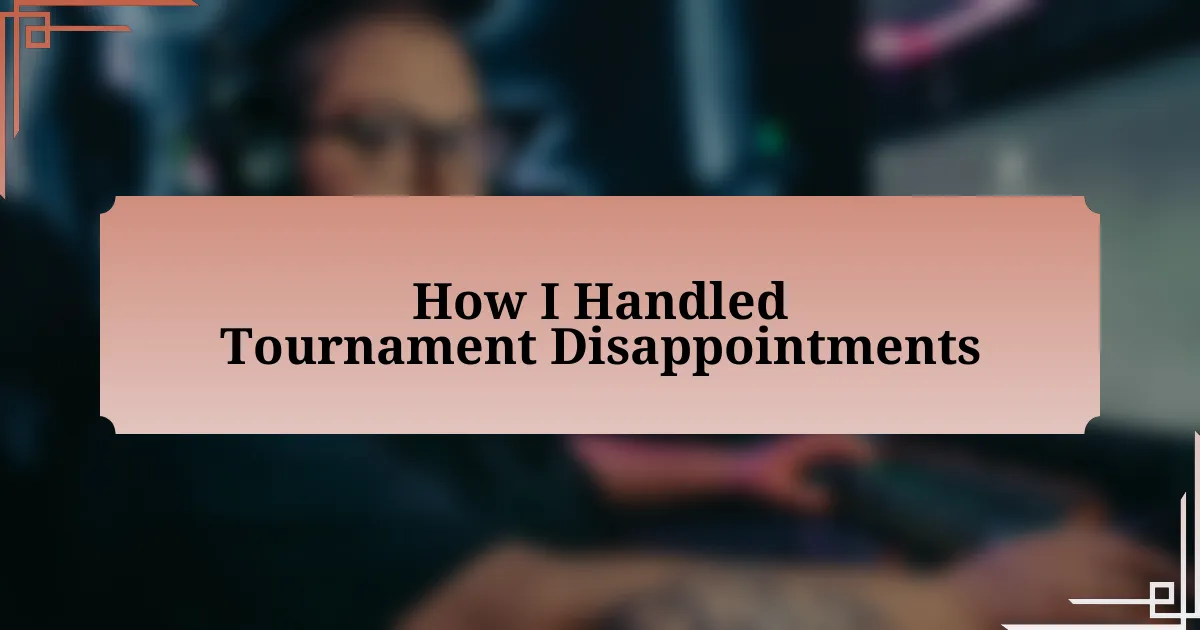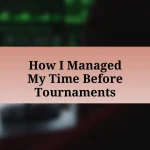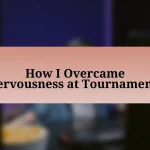Key takeaways:
- eSports tournaments require understanding complex formats and rules, influencing players’ strategies and outcomes.
- Mental resilience is crucial; players must learn to adapt and recover from setbacks to improve their performance.
- Building a support system among teammates can alleviate the emotional toll of competition and foster a sense of community.
- Reflecting on losses and setting realistic goals can help transform setbacks into opportunities for growth and motivation.
Author: Evelyn Hartley
Bio: Evelyn Hartley is an award-winning author known for her compelling narratives and richly drawn characters. With a background in psychology and literature, she weaves intricate tales that explore the complexities of human relationships and the intricacies of the human psyche. Her debut novel, “Whispers in the Dark,” was celebrated by critics and readers alike, earning her a dedicated following. Evelyn’s work has been featured in various literary journals and anthologies, and she frequently speaks at writing conferences and workshops. When she’s not writing, she enjoys hiking in the mountains and volunteering at her local animal shelter. She resides in Seattle with her two rescue dogs, Luna and Milo.
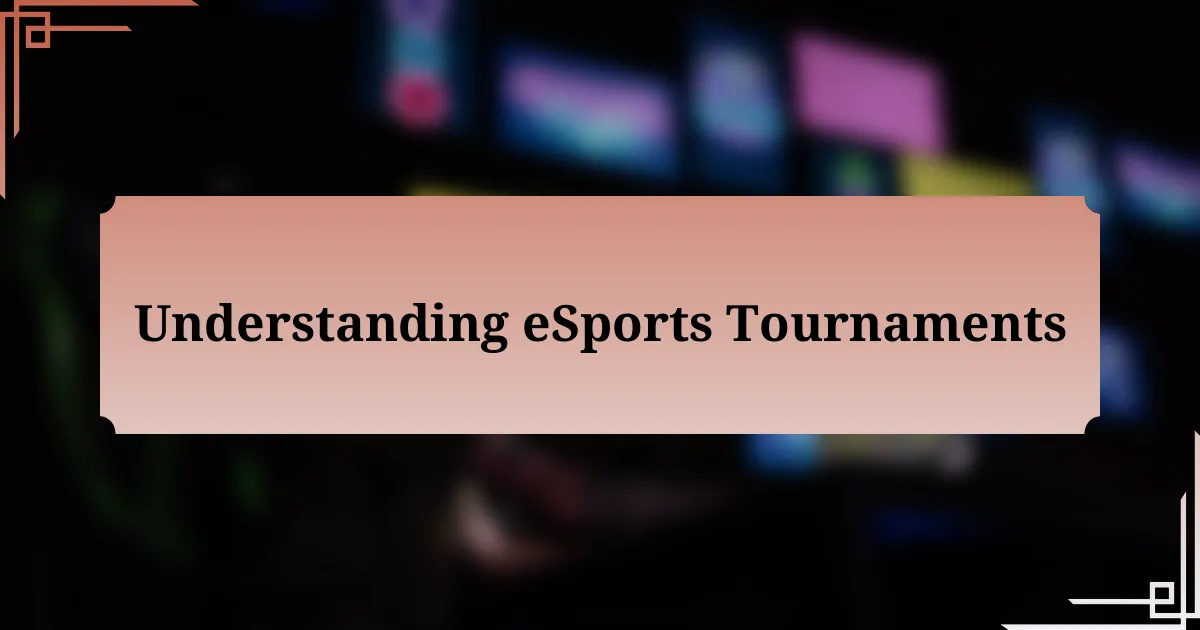
Understanding eSports Tournaments
In the world of eSports, tournaments are more than just competitions; they are a showcase of strategy, skill, and teamwork. I remember my first tournament vividly—the adrenaline, the sound of clicking keyboards, and the anticipation in the air were palpable. It was eye-opening to see how much preparation goes into these events, from understanding the tournament format to mastering the game’s meta.
As I delved deeper into the realm of eSports tournaments, I realized they vary greatly in scale and structure. Some are local events, while others are part of major leagues featuring hundreds of players and substantial prize pools. Think about it: have you ever wondered what it’s like to face off against the best players in the world? The pressure is immense, and every match can feel like a defining moment in a player’s career.
Understanding the scoring systems and rules of each tournament format is crucial for any aspiring player. I’ve often found myself grappling with complex formats like double elimination or round-robin and how they can influence outcomes. Have you noticed how a single misstep can change the entire course of a game? This unpredictability is what adds to the excitement and intensity of eSports tournaments, making every match an exhilarating experience.
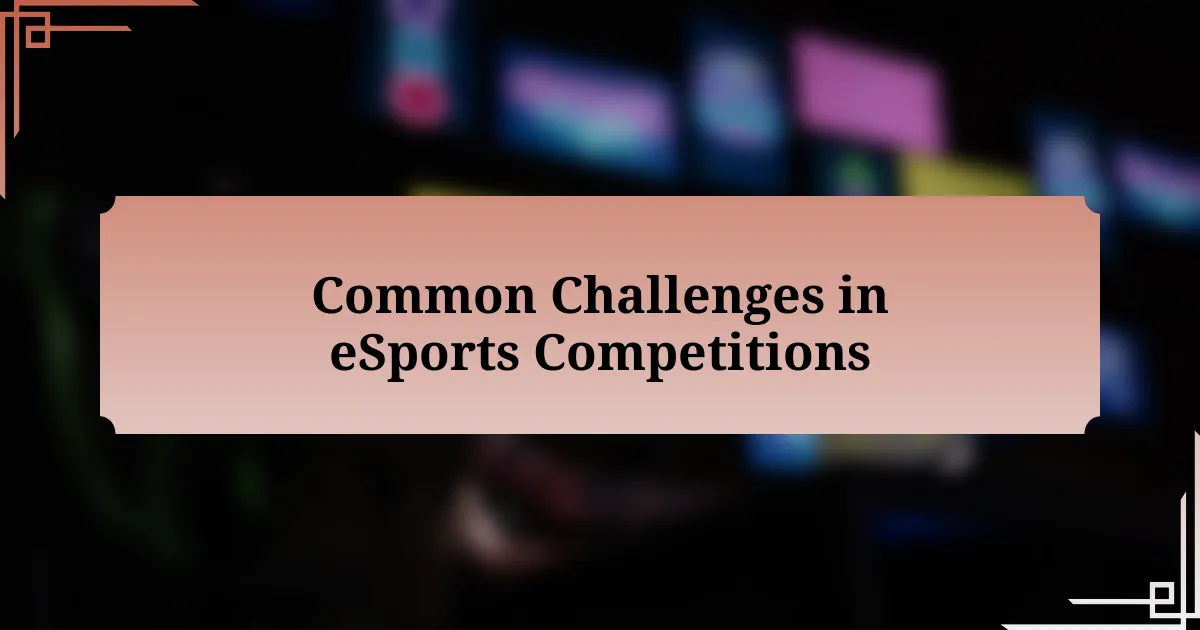
Common Challenges in eSports Competitions
Navigating the realm of eSports competitions often means confronting intense rivalries and high expectations. I distinctly remember a tournament where the stakes felt higher than ever. As I stepped onto the virtual battlefield, the weight of my team’s hopes bore down on me, and I realized that mental pressure can be just as challenging as technical skill.
Another challenge that frequently arises is the unpredictability of game patches and updates. I’ve experienced first-hand how a late-night patch can shift the game’s meta, leading to painstaking adjustments just days before competition. Have you ever tried to adapt your strategies overnight, only to feel like you’re fighting against a moving target? This constant evolution demands flexibility and quick thinking, skills that can make or break a player’s performance.
Technical issues also pose formidable challenges during tournaments. In one memorable match, my teammate’s connection dropped, leaving us vulnerable and scrambling to adapt. It’s a stark reminder of how quickly circumstances can shift, and sometimes, no amount of preparation can save you from unexpected obstacles. This reality often ignites a mix of frustration and resilience, driving players to become not just skilled gamers, but also adaptable competitors ready to overcome adversity.
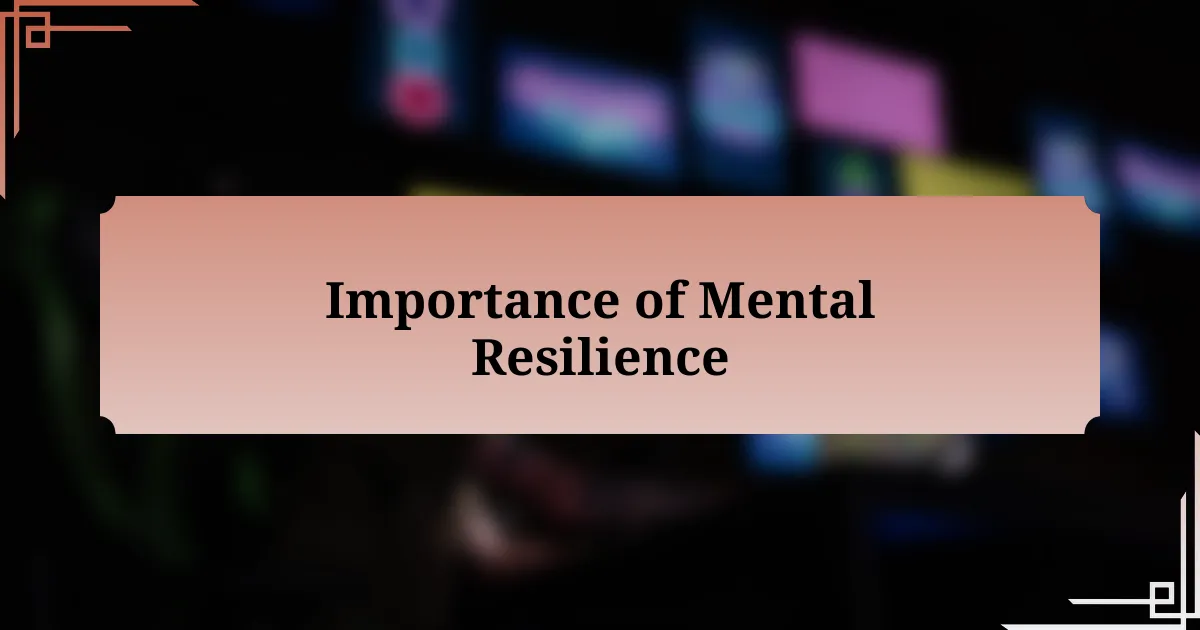
Importance of Mental Resilience
Building mental resilience is crucial in the high-pressure environment of eSports. I recall a tournament where I faced an unexpected loss in the semifinals. It stung, and I felt the initial urge to dwell on it. Instead, I learned to channel my disappointment into a learning opportunity, asking myself: how can I bounce back stronger?
The ability to adapt and recover is what truly separates good players from great ones. After a tough match, I often engage in self-reflection, identifying what went wrong and what I could have done differently. This practice not only strengthens my skills but also fortifies my mindset, reminding me that setbacks are part of the journey, not the end of it.
Moreover, cultivating a resilient mindset fosters a more positive gaming experience. I once played alongside a teammate who, despite a series of losses, remained optimistic and encouraged the rest of us. Seeing his determination made all the difference; it lifted our spirits and reignited our competitive drive. Isn’t it remarkable how a simple shift in attitude can transform our approach to challenges?
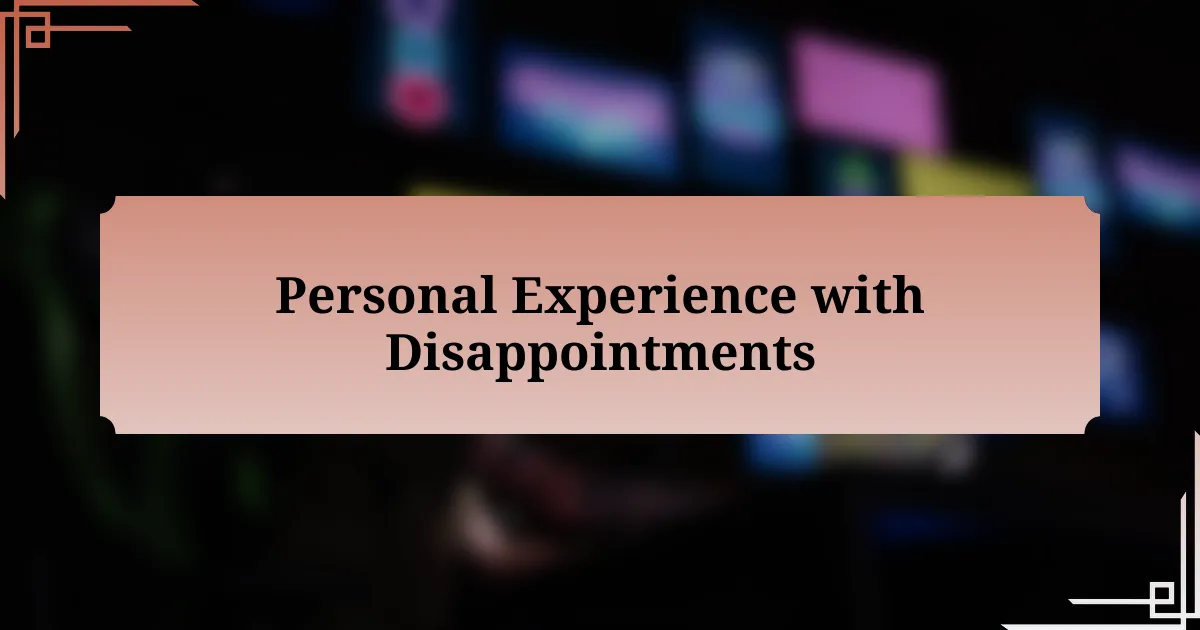
Personal Experience with Disappointments
There was a time when I entered a major tournament with high hopes, only to be knocked out in the group stage. My heart sank; I felt the weight of disappointment crash over me like a wave. In that moment, I wondered why I even bothered to compete when investing so much time and effort didn’t yield the results I wanted.
After the dust settled, I took a step back and really examined my feelings. I can still remember sitting alone, reflecting on how I let the loss define my mood for an entire week. It was eye-opening to realize that my mindset played a crucial role in how I would face future challenges. Instead of letting that defeat linger, I resolved to focus on the small victories, like improving my in-game strategy and building better communication with my teammates.
In another instance, I was part of a team that reached the finals but ultimately fell short. The intensity of that moment was overwhelming; I could see the trophy just within reach, yet it slipped away. This time, rather than wallowing in despair, I pulled my teammates together for a debrief. We shared our feelings, celebrated our journey, and recognized that each match was a stepping stone rather than a definitive ending. How often do we forget the value of camaraderie in moments of disappointment? Embracing that spirit of togetherness helped me view setbacks not as personal failures, but as collective experiences that shaped us.
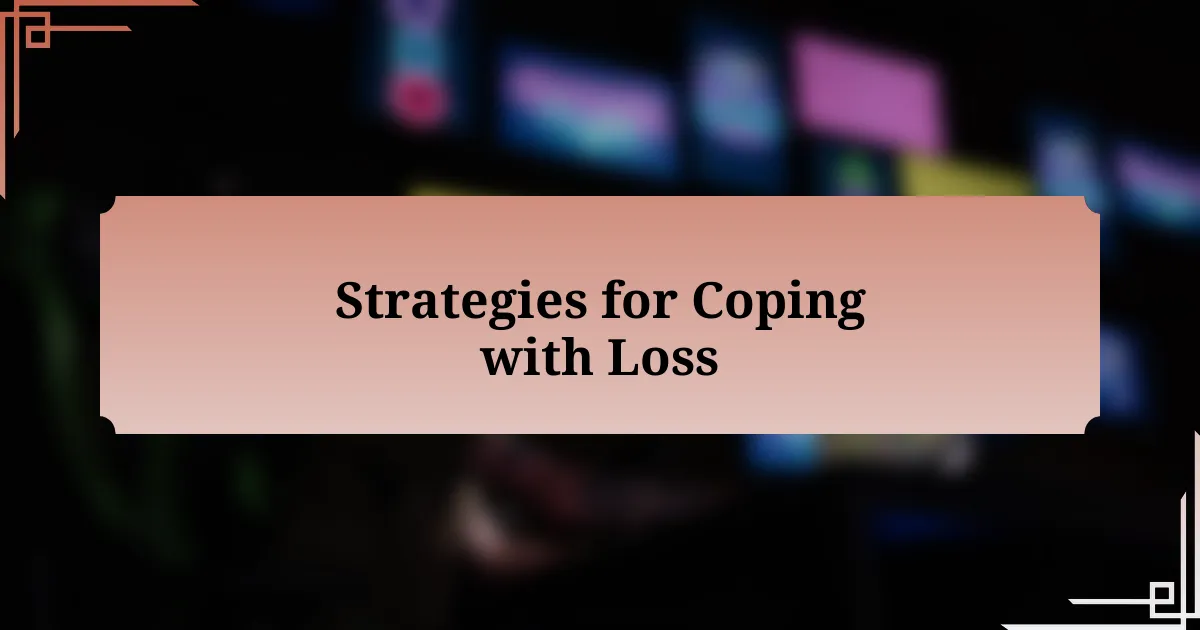
Strategies for Coping with Loss
One effective strategy I discovered for coping with loss is to channel my frustration into something constructive. After a particularly crushing defeat, I remember taking time to analyze each play. This practice not only improved my skills but also transformed my disappointment into motivation. How often do we overlook the power of reflection after a setback? By making the effort to dissect my performance, I felt a sense of control, ultimately paving the way for future success.
Another method that proved invaluable was establishing a support system among fellow gamers. In the aftermath of a loss, I found solace in reaching out to friends who understood the emotional toll of competition. We created a small group chat where we could vent our frustrations, share tips, and remind each other that we were in this together. Isn’t it reassuring to know that you’re not alone in your struggles? This connection alleviated the sting of defeats and fostered a sense of community that kept our spirits high.
Lastly, I learned the importance of setting realistic goals to prevent overwhelming disappointment. After a tournament where I set my sights too high, I decided to focus on specific areas of personal growth. Instead of aiming for a championship right away, I set intentions like mastering a new character or improving my communication in team plays. This shift in perspective helped me appreciate my progress and made losses less daunting. Have you ever thought about how small achievements can reshape your journey? By celebrating these incremental wins, I found a way to enjoy the process, regardless of the outcome.
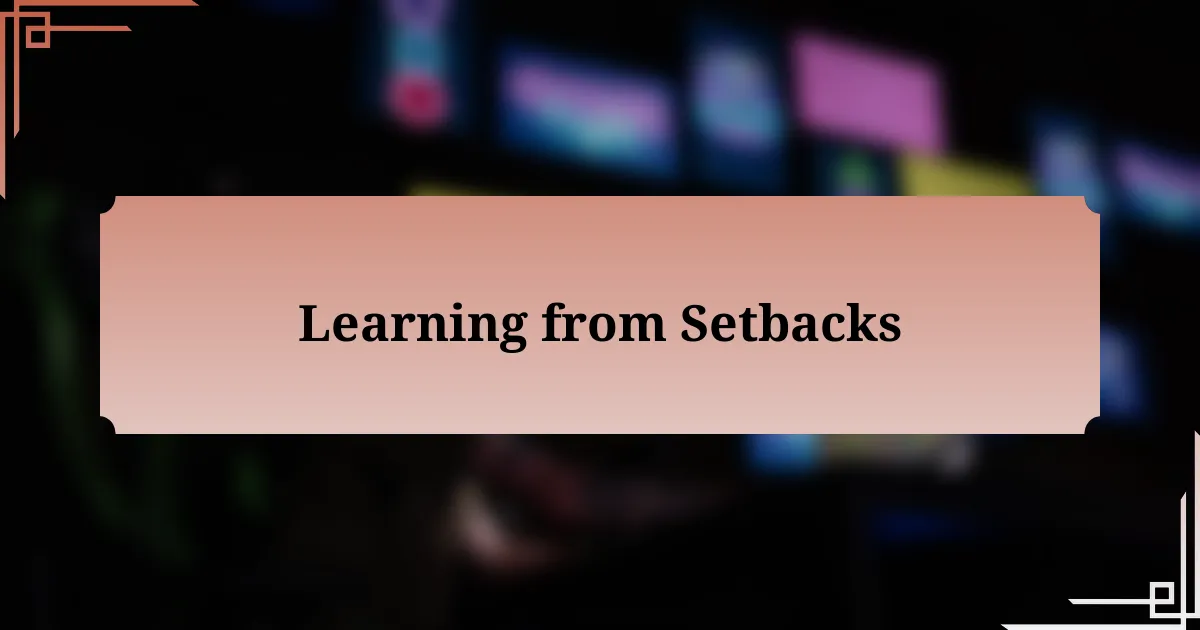
Learning from Setbacks
I remember a time after losing a crucial match that left me feeling defeated. Instead of letting that despair linger, I took a step back and reevaluated what went wrong. It’s incredible how our worst moments can teach us the most valuable lessons; I learned that self-scrutiny leads to a deeper understanding of my gameplay.
Reflecting on setbacks also often stirred emotions that I had to confront. Rather than bottling them up, I allowed myself to feel the disappointment, which was a game changer. Have you ever considered how embracing these feelings can actually foster resilience? By acknowledging my emotions, I discovered that they became a driving force, urging me to train harder and prepare better.
Another eye-opening realization was how every setback stripped away my ego, laying bare the areas in which I needed to improve. In one particular tournament, I failed to communicate effectively with my teammates, which directly impacted our performance. It was painful to recognize my shortcomings, yet this vulnerability was pivotal. How often do we allow ourselves to be truly honest about our failures? This process not only enhanced my skills but also strengthened my connections with my teammates, making us more cohesive than ever before.
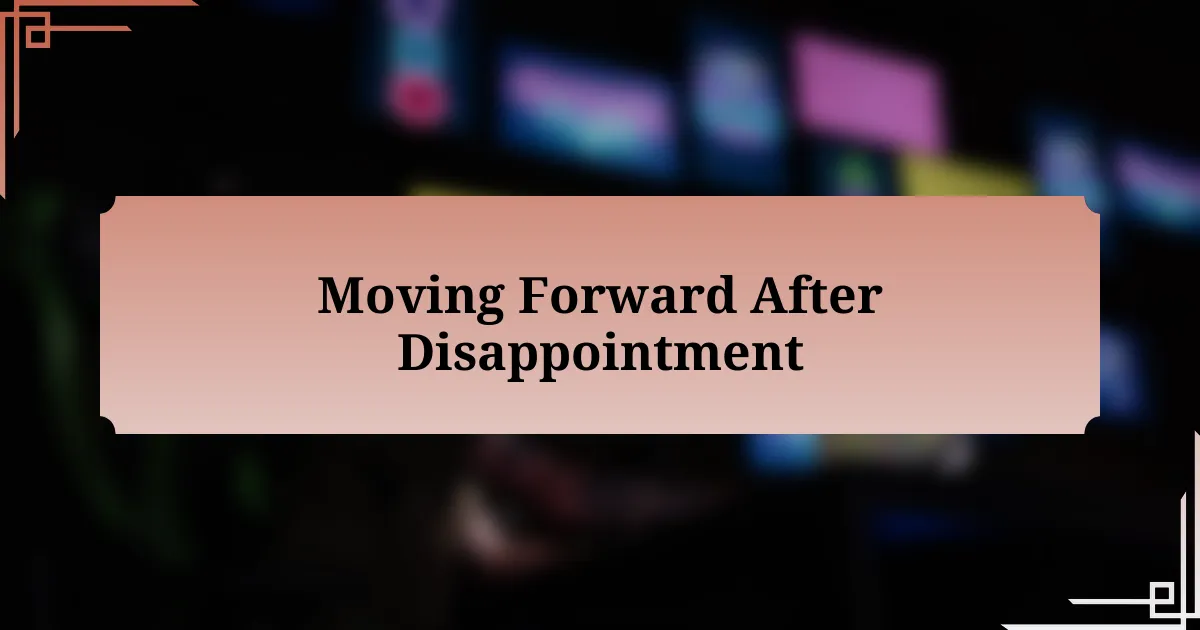
Moving Forward After Disappointment
The road to recovery after disappointment can be an emotional rollercoaster. I recall one tournament where our team faced an unexpected early exit. It felt like the world had crumbled around me. Instead of dwelling in that misery, I reached out to my teammates. We shared our feelings, and through that conversation, we found a renewed sense of purpose. Have you ever experienced the power of camaraderie in tough times? It’s enlightening how the support of others can propel us forward.
Moving on means setting new goals. After that disappointing loss, I created a plan that focused on my weaknesses while also acknowledging my strengths. This balance was vital for my growth as a player. For instance, I dedicated more time to practicing my strategy, an aspect I often overlooked. What if our failures can turn into stepping stones for our next victory? I truly believe they can if we choose to embrace them.
Lastly, I learned the importance of patience. Progress doesn’t happen overnight, and there’s beauty in the slow, steady climb back to success. I remember the day I finally executed a strategy I had been working on for weeks. The exhilaration of seeing my effort pay off was worth every moment of doubt. How often do we underestimate the value of the journey? I’ve found that every small win on that path becomes a reminder of what I’m capable of, keeping my spirits high for future challenges.

